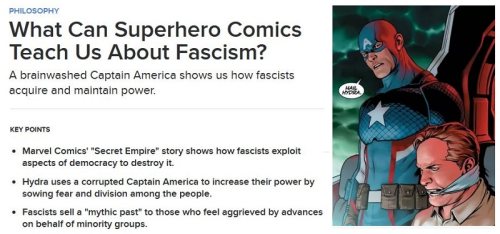 Wiley Blackwell, 2024 | Order from Amazon
Wiley Blackwell, 2024 | Order from Amazon
This is the updated and expanded version of my 2014 book, released to commemorate its tenth anniversary as well the release in early 2025 of the movie Captain America: New World Order.
For this edition, I thoroughly revised the text, updating examples and expanding coverage when appropriate, and adding significant new sections about the 2017 “Secret Empire” event and its parallels to real-world fascism, as well as Sam Wilson’s approach to being Captain America and how it compares with Steve Rogers’. I cite over 120 new comics, most from the ten years since the first edition, including Captain America comics written by luminaries such as Nick Spencer, Rick Remender, Ta-Nehisi Coates, and Christopher Cantwell (all in conjunction with amazing artists), as well as issues of the various Avengers titles and event comics such as Civil War II and (of course) Secret Empire.
See the page for the first edition to read my initial thoughts about the book as well as reviews, blog posts, interviews, and podcasts done for it; below I will post new materials related to the second edition as they come out.
BLOG POSTS
Check out my blog post at Psychology Today detailing how “Secret Empire” illustrates the tools and strategies of fascism:
I also posted there a number of times about Sam’s time so far as Cap in the comics:
- Exploring the Virtues of a New Captain America
- How Important Is Race to the New Captain America?
- Sam Wilson’s Parents and His Approach to Captain America
- Sam Wilson’s Proactive Approach to Being Captain America
Finally, I posted “How Sam Wilson Represents as Captain America” based on Sam’s cinematic bow as Cap in Captain America: Brave New World.
PODCASTS
I was honored to rejoin my friends at the Captain America Comic Book Fans group for the third time to take a deep dive into the new material in the second edition, especially fascism and the Secret Empire as well as Sam’s time so far as Cap.
My fifth appearance at Seize the Moment with Leon and Alen, discussing Cap’s tendencies toward moral perfectionism, how the fascist Cap of “Secret Empire” differed from the real thing, and the reason virtue ethics is even more important in the age of AI.
I returned to Good Is In the Details (also for the fifth time, believe it or not) to talk to my good friends Gwen and Rudy about the new book, and also Civil War, Cap and Iron Man’s different moral codes, Dr. Martin Luther King Jr., and superheroes’ legendary problems with relationships.
TABLE OF CONTENTS
Introduction
1 Superhuman Ethics Class
Utilitarianism | Deontology | A Civil War … of Ethics! | Virtue Ethics | Virtuous Deontology … No, Deontological Virtue … Maybe “Deontovirtue”?
2 Captain America as a Moral Exemplar
Can a Fictional Character Be a Moral Exemplar? | Aren’t Fictional Characters Liable to Be Perfect? | Sixty Years, Dozens of Writers … One Captain America?
3 Five Basic Virtues
Courage | Humility | Righteous Indignation | Sacrifice (and Responsibility) | Perseverance
4 Honor and Integrity
The Honor of Captain America | External Honor as Respect | Internal Honor as Integrity | How Deep Does Integrity Go? | Principle and Compromise | Duty and Sacrifice (Again)
5 Judgment
Making the Hard Decisions | Whose Right Answer? | Tragic Dilemmas and How to Avoid Them | When Judgment Evolves | Has the World Changed … or Has Captain America?
6 Patriotism, Fascism, and the Dream
Patriotism: The Captain and America | The Three Core American Ideals: Justice, Equality, Liberty | Cosmopolitanism | Fascism and the “Secret Empire” | The American Dream versus the American Reality
7 Principle and Politics
“I’m a Hero, Not a Politician!” | Principle above Politics | Captain America in (Principled) Action: Secret Empire/Nomad, The Captain, Civil War | A New Captain America | Proactivity, Conflict, and Compromise
